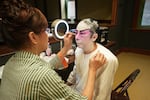請點擊閱讀《波特蘭新聞》(Portland Chinese Times)網上版與電子報版的中文翻譯報道。
Portland retired accountant Shirley Yee has always seen herself as a strong, direct woman — sometimes even “abrupt,” as her husband describes her. So when she takes the stage to play an ancient Chinese heroine, she feels right at home in the role.
“I want to sing songs that project a good female person … a very daring person that wants to be equal with the man and very intelligent,” she said. “I like to sing songs that have a character that I like to be.”
That character is Diu Sim, one of the four legendary beauties of ancient China famed for their influence over powerful men. Though fictional, Diu Sim is a central figure in “Romance of the Three Kingdoms,” a 600-year-old Chinese novel set during the chaotic final years of the Han dynasty, between the second and third centuries.
Last August, Yee and her husband performed “Gathering of Heroes: The Private Banquet,” a scene from the novel, at the main hall of the Oregon Chinese Consolidated Benevolent Association in Portland’s Chinatown.
Their performance was part of a larger event celebrating the anniversary of the Yat Sing Music Club — “Yat Sing” meaning “sounds of Cantonese” — a Cantonese opera group founded in 1942 by Chinese immigrants, who performed opera pieces with patriotic themes to raise funds for China’s defense against Japan during World War II.
In the half-hour opera piece, aligned with the club’s patriotic origins, Yee portrayed how Diu Sim, loyal to the Han imperial government, used her sweet and demure appearance to help overthrow a powerful warlord who had illegitimately taken control of the imperial court.
“I, little Diu Sim, gently move with lotus steps, step by step — one step, then another and another — toward the hall of blossoms. Tonight, a smile conceals the blade. My plots unfold like interlinked chains,” Yee sang in Cantonese.

Shirley Yee, stage right, portrays Diu Sim, while her husband, stage left, plays a powerful warlord’s son whom Diu Sim attempts to seduce, during their performance of the Cantonese opera piece “Gathering of Heroes: The Private Banquet” at the Chinese Consolidated Benevolent Association in Portland, Ore., on Aug. 24, 2024.
Arya Surowidjojo / OPB
Yee first came to the United States in the late 1960s, initially studying at the University of Kansas before transferring to Oregon State University in her junior year. Born and raised in British colonial Hong Kong, she had been trained in Western music, specifically piano and choral singing, throughout her teenage years. Yet, despite growing up hearing Cantonese opera drifting from neighbors’ radios, she never paid it much attention.
“We were led to believe that we must excel in English speaking (and) Western music to excel in our lives,” she said, reflecting on Hong Kong’s colonial culture at the time.
It wasn’t until many years later in Portland that Yee discovered her passion for Cantonese opera. A friend of her husband’s introduced her to the traditional art form and to the Yat Sing Music Club more than a decade ago. There, she learned a surprising difference: the music scores were written in Chinese characters, not the familiar Western “do-re-mi” notation she was used to.
“I really like it because the lyrics are very poetic,” she said. “A lot of Chinese operas have a little bit of history… it’s always ‘good people win.’”
“It makes a person feel good that virtue, loyalty to the country, and kindness of people always prevail.”
Global journey of Cantonese opera
Also known as Yueju, Cantonese opera was recognized by UNESCO in 2009 as an intangible cultural heritage of humanity. It’s a rich blend of music, singing, martial arts, acrobatics and acting, with performances featuring string and percussion instruments, elaborate costumes and intricate face painting. Deeply woven into daily life in southern China, it’s often performed at festivals, temple fairs and community events.

Yat Sing Music Club member Eva Siew Hop Fan, right, receives assistance from a cosmetician while applying makeup for the role of Co Wan in the Cantonese opera "Handsome Pun On," at the Portland Chinatown Museum in Portland, Ore., on Aug. 24, 2024.
Arya Surowidjojo / OPB
Scholars still debate exactly how Cantonese opera originated, but most agree it evolved between the 16th and 18th centuries, as various regional theatrical traditions spread into Guangdong province.
Interestingly, early performances were sung in Mandarin; it wasn’t until the late 19th and early 20th centuries that performers shifted to singing in Cantonese, giving the genre its distinctive local flavor. Over the years, the genre has developed a rich repertoire of stories drawn from historical epics.
Historian Wing Chung Ng of the University of Texas, San Antonio, who has studied Cantonese opera for more than two decades, explains that many Chinese migrants during the late 19th and early 20th centuries were Cantonese speakers, and they carried Cantonese opera with them wherever they went, especially into North American Chinatowns.
During that time, professional troupes from China and Hong Kong, along with locally developed amateur musicians, performed Cantonese operas for Chinese diaspora communities. For many, these performances were a major source of entertainment and cultural connection, especially at a time when anti-Chinese racism was widespread in North America following the enactment of exclusionary immigration laws.
“During the exclusion era, Chinese migrants were typically confined to their almost scattered-like settlements in Chinatown, and they didn’t have access to entertainment provided by mainstream society,” Ng said. “So pretty much if there’s a chance to enjoy Cantonese opera, they’d flock to it. If there’s a (theatrical) company in town, they would definitely go and have a good time.”
Ng also notes that many professional troupes and Cantonese opera-related businesses had active operations in Guangzhou and Hong Kong before 1949, particularly during the 1920s and ’30s before the Sino-Japanese War disrupted travel. This activity largely continued until 1949, when the establishment of the People’s Republic of China by the Communists brought major political and social changes.
Ng believes many of the costumes and banners still kept by the Yat Sing Music Club today — labeled and embroidered in Guangzhou or Hong Kong — were originally imported in the mid-1930s to early 1940s. They likely arrived indirectly, via professional troupes traveling through San Francisco, home to North America’s oldest Chinatown.
“They would bring trunks of costumes and other materials with them,” he said. “Later on, some of these costumes were left behind by companies when they departed from North America, and as a result, some museums in the United States and Canada have had collections of those costumes around.”
Costumes of the past
Unfortunately, Yat Sing hasn’t been able to preserve all the costumes, banners and headdresses it once had. Club members estimate that about 95% of these treasures have been lost over the years; they were destroyed by fire and flooding, misplaced during multiple relocations, or simply discarded.
Still, at least one precious artifact remains: an antique steamer trunk in the club’s storage space holds a white costume embroidered with a blue Chinese dragon. A label sewn inside shows it was made in Guangzhou’s Huangsha district, a historic center for Cantonese opera troupes and costume makers.
Remarkably, a performer wearing a costume with the same embroidered dragon and patterns appears in a framed Yat Sing family photo taken after a performance in 1942, the year the club was founded.

A framed Yat Sing Music Club group photo taken after a performance features an actor (third from the right) dressed in a dragon robe. The Chinese inscription on both sides of the frame indicates that the photo was presented as a gift from the club to a guest during the 31st year of the Republic of China, which corresponds to 1942.
Jeff Kastner / OPB
John Lee, the club’s oldest current member, immigrated from Taishan in southern China to Portland in 1950, sponsored by his grandfather who ran a grocery store. Soon after arriving as a teenager, Lee joined the Yat Sing Music Club.
“When I was young, I was interested in music. I listened to musicians playing and learned from them. They saw I was smart and taught me how to play. I can play several instruments,” Lee, now 90, said in Taishanese, a dialect of Cantonese.
Lee remembers that during his wedding in Hong Kong decades ago, he learned the symbolic meaning of the dragon costume from opera masters: “Only the emperor could wear a dragon robe.”
Historically, that’s true.
Dragon robes, reserved for emperors during the Ming (1368–1644) and Qing (1644–1911) dynasties, symbolized supreme authority. However, generals, ministers and other noble figures were allowed to wear robes embroidered with a Chinese python, a mythological creature almost identical to a dragon.
At Yat Sing’s anniversary show last August, Chairperson Richard Kwong wore a China-made red robe embroidered with a golden python as he played Prince Consort Zau Sai Hin, opposite Vice-Chairperson Cindy Ng, who portrayed Princess Coeng Ping, in “The Fragrant Sacrifice.”

Yat Sing Chairperson Richard Kwong, right, and Vice-Chairperson Cindy Ng portray Prince Consort Zau Sai Hin and Princess Coeng Ping — tragic lovers from the late Ming dynasty who chose death over surrender to the Qing regime — during their performance of “The Flower Princess: The Fragrant Sacrifice” in Portland, Ore., on Aug. 24, 2024.
Jeff Kastner / OPB
The song is from “The Flower Princess,” an opera that tells the tragic story of two lovers who chose to end their lives during their wedding ceremony by drinking poisoned liquor, a final act of resistance against the foreign Manchu-led Qing dynasty.
Born in Hong Kong in 1957, Kwong inherited a love for opera from his grandfather, though his father opposed it and sent him to study in Britain. After years focused on engineering, he rediscovered Cantonese opera in the U.S. In 2008, he joined the Yat Sing Music Club, performing in a benefit for victims of the Sichuan earthquake.
Kwong and his fellow musicians, many older than him, have spent nearly two decades practicing almost every weekend. Now they rehearse at a space inside the Portland Chinatown Museum, just across the street from the CCBA building.
Club members still fondly remember how their founders, many of whom were blue-collar workers in restaurants and laundromats, would religiously gather every Monday night after long workdays and practice into the early hours of Tuesday morning, out of sheer dedication to the art.
Hope for revival
But as many senior members have passed away, Kwong now worries about the club’s future. Few young people show interest in joining, and their audiences are mostly from the older generations.
Kwong admits it’s an “uphill battle” to keep Cantonese opera, an art form composed of songs that can last half an hour each, alive in Portland, even within his own family.
“Even my son doesn’t like it: when I practice at home, he says, ‘Shut up, Dad! Don’t sing! You go back to your bathroom and sing!’” Kwong said, laughing.
“Nowadays people are so used to fast-paced (things)… just like TikTok. If you cannot finish a song in two minutes, you’re out, let alone having to listen to half an hour of singing. It will be torturous,” he added.

Richard Kwong (right, background) practices Cantonese opera with fellow Yat Sing members at the Portland Chinatown Museum on June 9, 2024.
Jessie Sears / OPB
Keeping Cantonese opera alive has never been easy, even in China. During the Cultural Revolution from 1966–1976, traditional art forms were brutally suppressed. Actors, playwrights and theater workers who didn’t align with the Communist Party’s ideology were persecuted, imprisoned, or worse.
Meanwhile, under British colonial rule, Hong Kong saw a golden age of Cantonese opera in the 1950s and ‘60s, with packed performances at commercial theaters across the city. It wasn’t until the 1980s that Cantonese opera began to slowly revive on the mainland of China.
In recent decades, modernization and the rise of new entertainment options have posed fresh challenges to the survival of the art form, both in Hong Kong and mainland China. In response, local authorities in Guangzhou and Hong Kong have launched initiatives to preserve Cantonese opera, including post-secondary education programs to train young performers.
In Hong Kong, professional troupes and higher institutions have created programs to expose high school students to the art form. Earlier this year, one troupe even gave Cantonese opera a modern twist — staging a production that featured U.S. President Donald Trump singing in Cantonese, set against the backdrop of contemporary global affairs rather than ancient China.

Actor Roger Chan portraying U.S. former Vice President Kamala Harris, left, and Lung Koon-tin playing the part of U.S. President Donald Trump perform in a Cantonese opera at the Sunbeam Theatre in Hong Kong on Feb. 3, 2025.
Chan Long Hei / AP
Historian Wing Chung Ng of the University of Texas, San Antonio, acknowledges that connecting younger generations in North America to Cantonese opera remains a daunting task. Language barriers and a lack of personal connection to the art form are significant hurdles.
But Ng remains hopeful.
“(Cantonese opera) would never die,” he said. “I would encourage, for someone who is not familiar, just give yourself an opportunity to take it in, walk into a theater and see what it is like, because it’s such an impressive, encompassing, multifaceted performance.”
Back in Portland, Shirley Yee and her fellow members of the Yat Sing Music Club are doing just that — reaching out beyond Chinatown to share their passion. Over the past decade, they’ve performed at places like the Oregon Historical Society and the Asian Health and Service Center, and collaborated with other Cantonese opera groups across North America to keep their club vibrant.
Even though the club’s membership is much smaller than it once was, Yee remains optimistic.
“Whoever stays, we try (to) put up the best part of ourselves, and eventually it goes back up and comes up again,” she said.

Yat Sing members pose for a group photo on stage following their performance at the Chinese Consolidated Benevolent Association in Portland, Ore., on Aug. 24, 2024.
Jeff Kastner / OPB
This story was written, reported and digitally produced by Winston Szeto and edited by Arya Surowidjojo, in partnership with Oregon Art Beat, with photos and video by Jeff Kastner, Jessie Sears and Arya Surowidjojo, graphic animation by Emily Hamilton, and visual editing by Summer Luu and Arya Surowidjojo. Illustration by Jenny Davanh / image source: Jeff Kastner, OPB.

Learn more about the Chinese American experience in Oregon:
- Her name means ‘hero’: How Portland pilot Hazel Ying Lee fought for America — only to be forgotten
- Remembering the 1887 massacre at Hells Canyon
